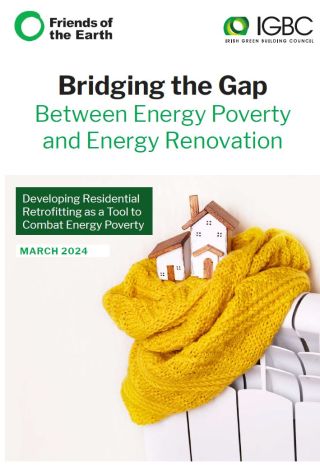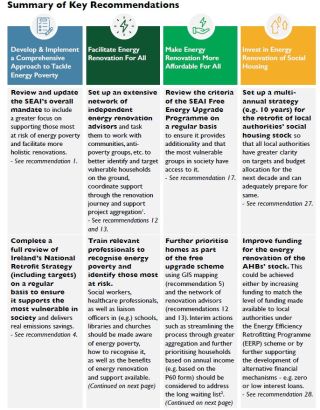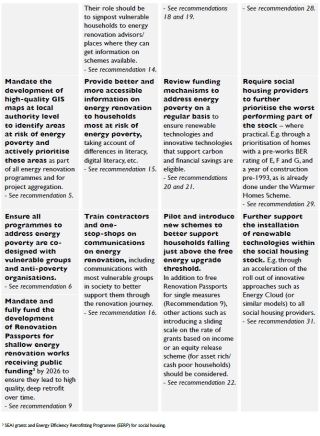Bridging the Gap Between Energy Poverty and Energy Renovation

A new report by the Irish Green Building Council and Friends of the Earth examines how Government could bridge the gap between energy poverty and energy renovation. In particular the report looks at home targeted residential retrofitting and energy renovations programmes might combat energy poverty and improve the energy efficiency of the housing stock. Increases in investment in residential retrofits in recent years have led to a significant reduction in carbon emissions associated with this sector. Yet almost a third of Irish households were at risk of energy poverty in 2022. This report makes a series of policy recommendations to Government on how to better address energy poverty in Ireland through ambitious and targeted energy renovation programmes.
Main findings
Addressing energy poverty through energy renovation is key in tackling economic, social and health disparities whilst reaching Ireland’s climate targets. Operational emissions from the residential sector account for 9.7% of Ireland’s national emissions. Already, efforts to reduce these operational emissions, by both improving building efficiency and increasing the share of renewable energy, have begun to bear fruit.
The report ‘ Bridging the Gap Between Energy Poverty and Energy Renovation: Developing Residential Retrofitting as a Tool to Combat Energy Poverty’ puts forwards a set of policy recommendations to better address energy poverty though renovation. Retrofitting of energy poor homes has the potential to enhance living conditions while contributing to environmental sustainability and reduced greenhouse gas (GHG) emissions. It creates the opportunity to make homes more energy efficient whilst also promoting economic resilience and equal access to essential energy services for vulnerable communities. In essence, energy renovation in the residential sector must not be viewed as purely a climate action tool but also as a fundamental poverty reduction measure which can improve quality of life and increase resilience.
This report puts forwards a set of policy recommendations to better address energy poverty though renovation. The main themes highlighted in this report explore ways to improve the targeting of the most vulnerable in our society, facilitate energy renovation for all, improve affordability, and increase investments in the social housing stock. It also highlights the importance of renewable energy sources, as renovation on its own may not always be sufficient to bring people out of energy poverty. Research indicates that although improving the BER of a home is key to improve health and wellbeing, and an important anti-poverty measure, many households may still be paying more than 10% of their annual net income to heat their home, and may still remain in energy poverty, post renovation. Therefore, these energy efficiency measures need to be complemented by support for renewable energy sources and/or battery storage to ensure that heating and energy costs are kept to a minimum.
Recommendations


